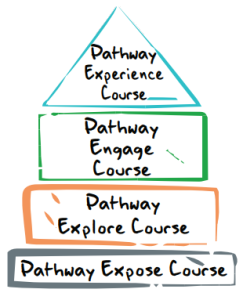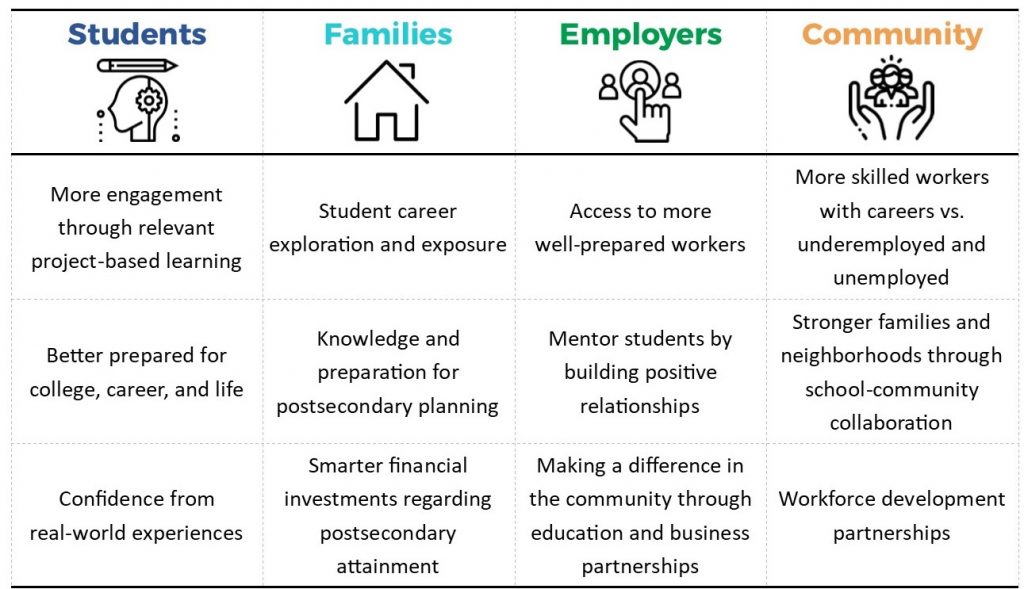Academy and Pathway Structure
What is the Rapid City Pathways Approach?
The Rapid City Pathways Approach (RCPA) will bring intentional career-connected learning into Rapid City Area Schools, as well as build strong connections to employers, institutions of higher education, and community-based organizations. This work began in June of 2018 under the direction of the Pathways Task Force; whose members include educators, community, and business leaders in partnership with the National Center for College and Career Transitions (NC3T) with funding support from the John T. Vucurevich Foundation.
What is the purpose of the Rapid City Pathways Approach?
The purpose of the RCPA is to equip our students with the knowledge and skills they need to explore career options throughout each level of school and participate in a career academy in high school. This approach will help students develop a plan that leads graduates to a successful transition beyond high school including postsecondary education and training, careers, and life responsibilities.
What is an academy?
An academy is a small learning community organized into one or more pathways that includes career-connected learning and provides students with increased personalized attention.
What is a pathway?
A pathway is a course of study housed with one of three academies (high school graduation requirements will be embedded) offered in our two comprehensive high schools. Each pathway includes two or three courses organized around a career theme and offered in a planned sequence of courses that move from general knowledge to deeper skills.
Within an RCAS Academy, a student will take:
- A Pathways Explore Course;
- A Pathway Engage Course;
- An optional Pathway Experience Course; and
- Electives, including Fine Arts, World Language, Physical Education, and Special Offering courses.

What are the RCAS Academies?
RCAS will offer several pathways organized into three academies and nine pathways that are not only tailored to our regional needs, but also address national and global workforce opportunities.

How were the RCAS Academies and pathway selected?
Over 90 business, postsecondary, and community partners helped RCAS leaders to determine the RCAS Academies and pathways to begin initial implementation. The focus on these areas was made through deliberate use of workforce data while begin mindful of the overall high school enrollment, capacity, and resources as well as projected job growth. There are numerous pathways for consideration and as the academies are implemented and grow, there may be a need for modifications based on student interest and other factors.
What are the benefits of an academy and pathway system?
The academy and pathway system is designed to support the development of college, career, and life readiness skills so that students can successfully enter and advance in a career path.
Will all three RCAS academies and ten pathways be located at both high schools?
It has been determined that both high schools will offer the Freshman Academy and the three RCAS Academies.
What is GRADtime?
GRADtime is a dedicated period of time that will offered eight times per year where students will receive Graduation, Readiness, Advising, and Direction from school counselors in a classroom setting through an online learning platform. This advisory course will allow students to have intentional time to explore college and career options, reflect on their own educational journey, and obtain the skills needed to fulfill the RCAS Profile of a Graduate.
How will students identify a career interest?
During elementary and middle school, each student will be learning about a full range of careers, and during their 8th grade year, will identify a ‘career interest’ to guide further exploration. This career interest will be revisited each year and can evolve or shift. The student’s career interest will influence their choice of career academies, career pathways, work-based learning experiences, postsecondary education and training, and employment opportunities.
How will students select their pathway?
Student will be asked to identify their top pathway preferences after they explore the three RCAS Academies and nine Pathways during the Freshman Seminar course.
Will students be locked into a pathway?
Through the 8-10th grade exploration experiences and career development courses, students will begin to learn what options are a good fit and what areas they are not interested in and are not a good fit. Students will be able to explore an academy in 10th grade and, should that not be a good fit or their interest changes, they can switch to another academy during 11th grade.
Will students be expected to make a career decision?
Students will be encouraged to explore career interests, but they will not be pressured to make an actual career decision.
Some students do have a very specific career goal coming out of high school. There will always be some students who know exactly what they want to do. The goal for these students is to help identify their next steps.
Many students will not have a specific career goal by the end of high school and that’s ok.
What if students are not prepared to make decisions about life after high school?
The purpose of the RCAS Academies is to help all students make well-informed decisions about college, career, and life aspirations. For each pathway, teachers and counselors will explain the range of options that are open to students and what type of postsecondary education and training they need to pursue these careers. It is up to the individual student, with advice and support from their parents and caregivers, to decide what direction is best for them.
Will the RCAS Academies limit postsecondary opportunities?
Each of the RCAS Academies and pathways are being designed with three potential outcomes. These outcomes are not mutually exclusive:
- an industry-recognized certification while in high school or after a short-term training program;
- an associate degree at a two-year or technical college; and
- a bachelor’s degree at a four-year college or university.
By including all three options in every program, the pathway programming is made relevant for all students whether immediately following high school they wish to enter the workforce or college.
How will the RCAS Academies affect fine arts students?
We currently have, and will continue to maintain, robust fine art course offerings. All students will continue to have the opportunity to participate in music programs, art courses, and dramatic arts as graduation requirements include one credit devote to the fine arts and the 4.5 minimum elective credits remain the same. As is the case now, more than 80 percent of our high school graduates exceed the high school graduation credit requirements to pursue their academic and creative interests.
For students who desire to pursue arts as a progression, their experience will be enhanced by linking their talents to either a design, business, education, or other pathway of their choosing. Furthermore, as pathway courses are developed, courses may emerge that are specific to those students who are interested in a career in the fine arts. Additionally, work-based learning placements or senior capstone experiences for these students may include work with community-based arts organizations that exist in our community.
How will this impact at-risk and special needs students?
For at-risk students, the hope is that more relevant high school experiences will lead to better outcomes. Additionally, a workgroup is exploring ways to help at-risk students be successful under this new academy model.
The academy and pathways programming will provide students with disabilities the opportunity to select an academy and pathway of study that meets their IEP transition needs (academic, vocational, social, emotional, and recreational experiential). Students with mild learning disabilities will enter an academy just as other students do while students with more significant disabilities will enter the Academy of Human Services and Education with a pathway that focuses on basic life skills and workplace readiness that will prepare these students with more moderate to significant disabilities that meet their unique needs.
Does RCAS have a plan for implementing World Languages in the RCAS Academies?
Students will be encouraged to pursue World Languages as not only an area of interest, but also to enhance their high school experience through use of elective credits. We do envision that the World Languages have a valuable role in all six of the RCAS Academies. Additionally, as students evaluate the opportunity to earn the new Advanced Honors Endorsement, we hope many students will choose to pursue a World Language as the 2 units of Career and Technical Education will already be embedded in the RCAS Base Diploma.
Business Engagement
What role will business and industry play in the RCAS Academies?
Business, industry, and postsecondary engagement and partnerships have and will continue to serve as an integral piece of the RCAS Academies as students will rely on these connections to have successful career-connected opportunities. In addition, each academy will have an advisory council that provides input on workforce trends, curriculum & equipment, work-based learning activities, and teacher externships.
We know that we cannot do this work alone and have invited representation from many industries to join us in our work. With that, we are also continually looking for additional partners to join us as we move in this direction. If you have a specific person, business, or postsecondary connection you feel would greatly enhance this work, please direct them to the RCAS Community Partnership Opportunities page.
How can we ensure that our students are prepared for jobs that are available globally, not just locally?
Each of the RCAS Academies and pathways reflect the high-wage, high demand workforce development needs and opportunities that not only exist in the state of South Dakota, but globally. The only exception to this may be the Hospitality & Culinary Arts pathway. With this pathway, RCAS is being mindful of a regional and local need. Behind Agriculture, tourism is the 2nd largest industry in South Dakota and brings in about $2 billion annually. This industry is especially important to the Black Hills region and many RCAS patrons. Additionally, the Rapid City Office of Economic Development projects there will be high demand through 2025 for high-wage careers in the beverage and restaurant industry.
Graduation Requirements
Students are required to complete 22 credits that ensure they graduate college, career, and life ready. To learn more about the graduation requirements for the graduating class of 2024 and beyond, click here.
What are the Advanced Endorsements?
The new graduation requirements allow students to earn Advanced Endorsements that align with their college, career, and life ready plan. To learn more about the South Dakota Graduation Requirements and Advanced Endorsements, click here.
|
Advanced Endorsement |
||
| Indicates a student has pursued coursework consistent with entranced requirements for postsecondary education. | Indicates a student has career experience in a concentrated area, based on academic and/or workplace experience and a related credential. | Indicates a student has pursued advanced rigorous, academic coursework consistent with 13-55-31. |
Can students still choose electives? If so, how many each year?
The number of elective credits will remain unchanged at 2.5 during grades 9-12. Students can take more credits than what is required by the Base Diploma. In fact, more than 80 percent of our current graduates have taken more credits than the state credit requirement.
